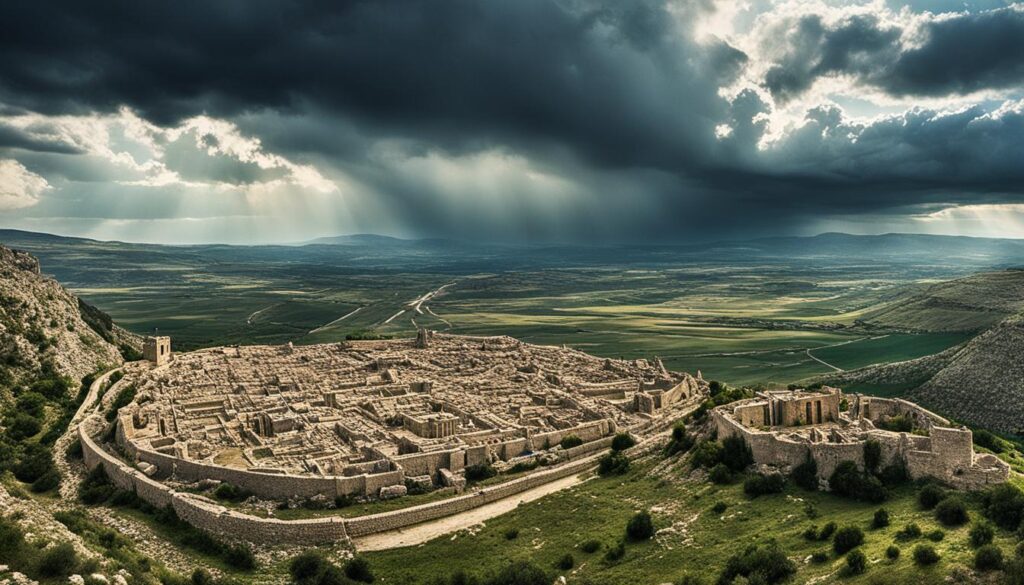Galatia, a region mentioned in the Bible, holds great significance in biblical history and Christianity. From its geographical location to the archaeological discoveries found within its borders, Galatia offers valuable insights into early Christianity and biblical geography. Understanding this ancient region can deepen our understanding of the New Testament and the impact of the apostle Paul’s letters.
Key Takeaways:
- Galatia played a major role in early Christianity and the spread of the faith.
- The letters of the apostle Paul to the Galatians highlight important theological themes.
- Archaeological discoveries in Galatia provide evidence of its historical and cultural significance.
- Galatia’s geographical location made it a crossroad for various cultures and ideas.
- Studying Galatia in the Bible helps us appreciate the depth of God’s redemptive plan.
Historical Background of Galatia
In ancient times, Galatia was a region located in what is now central Turkey. The area was inhabited by the Galatians, a Celtic people who migrated to the region in the 3rd century BC. This historical background sets the stage for Galatia’s role in biblical history and early Christianity.
Galatia holds significance in the Bible due to the visits of the apostle Paul during his missionary journeys. Paul established churches in Galatia and later wrote a series of letters to the Galatians, known as the Epistle to the Galatians. These letters addressed important theological issues and emphasized the message of salvation by faith.
The image above visually represents the biblical significance of Galatia, providing a glimpse into the historical context of this region and its connection to early Christianity.
| Key Points | Details |
|---|---|
| The Galatians | The Galatians were a Celtic people who migrated to Galatia in the 3rd century BC. They inhabited the region during biblical times and played a significant role in the spread of Christianity. |
| Paul’s Visits | The apostle Paul visited Galatia during his missionary journeys, establishing churches and nurturing the early Christian communities in the region. |
| Epistle to the Galatians | Paul wrote a series of letters to the Galatians known as the Epistle to the Galatians. These letters addressed theological issues and emphasized salvation by faith. |
Exploring the historical background of Galatia allows us to delve deeper into biblical history and gain a better understanding of the early Christian movement. It provides valuable insights into the cultural, social, and theological aspects that shaped early Christianity in this region.
Paul’s Letters to the Galatians
The Epistle to the Galatians, written by the apostle Paul, holds a significant place in the New Testament. This letter explores important theological themes and addresses the issue of Jewish legalism, emphasizing the core teachings of salvation by grace through faith.
Paul’s letter to the Galatians reminds the readers that they no longer need to adhere to the Jewish laws and rituals for their justification. Instead, their faith in Jesus Christ is what brings about their salvation. The letter emphasizes the freedom and unity found in Christ, contrasting it with the legalistic mindset of the Judaizers.
“For in Christ Jesus, neither circumcision nor uncircumcision counts for anything, but only faith working through love.” – Galatians 5:6
This epistle not only addresses the specific circumstances in the churches of Galatia but also contains timeless teachings applicable to believers throughout history. It highlights the crucial role of faith in Christ and the sufficiency of God’s grace for salvation, reminding readers of the importance of their relationship with Christ rather than relying on outward rituals.
Theological Themes in Galatians
The Epistle to the Galatians tackles various theological themes that have shaped biblical theology. Some key aspects include:
- The doctrine of justification by faith: This letter emphasizes that righteousness is not attained through the works of the law but through faith in Jesus Christ.
- The freedom found in Christ: Galatians highlights the freedom believers have from legalistic practices and the freedom to live by the Spirit.
- The unity of believers: Paul stresses the unity that exists among believers in Christ, regardless of their ethnic or cultural backgrounds.
Key Themes in Galatians
| Themes | Description |
|---|---|
| Justification by Faith | Emphasizes that righteousness comes through faith in Christ rather than adherence to the Jewish laws. |
| Freedom in Christ | Highlights the freedom believers have from legalism and the ability to live by the Spirit’s guidance. |
| Unity of Believers | Stresses the unity that exists among believers, transcending cultural and ethnic boundaries. |
Paul’s letter to the Galatians offers valuable insights into the early development of Christian theology and provides guidance for believers navigating issues of legalism and grace. Its teachings continue to be relevant and impactful in the pursuit of a genuine and vibrant Christian faith.

Geographical Significance of Galatia
Galatia, located in central Turkey, held great importance in biblical geography and the New Testament. It occupied a strategic position that served as a crossroad between different regions and cultures. The region was divided into two parts: Galatia proper and Lycaonia. It is within these areas that the churches mentioned in Paul’s letters were located.
Understanding the geographical context of Galatia helps us visualize the spread of early Christianity and the challenges faced by the early believers in this diverse and cosmopolitan region. The location of Galatia in biblical history provides valuable insights into the growth and development of Christianity in the ancient world.
“Galatia, as a geographical region, played a significant role in the early Christian movement. It served as a hub where different cultures and ideas intermingled, creating a unique environment for the spread of the gospel.”
Galatia’s position as a cultural crossroad allowed for the exchange of ideas and the influence of various beliefs. This context shaped the challenges faced by the early believers and the theological issues addressed in Paul’s letters. Exploring the geographical significance of Galatia deepens our understanding of the New Testament and the impact of the early Christian communities in this region.
Archaeological Discoveries in Galatia
Archaeological excavations in Galatia have brought to light a treasure trove of artifacts and structures that shed light on the ancient history of the region mentioned in the Bible. These remarkable discoveries provide valuable insights into the cultural and historical context of the biblical events that unfolded in Galatia. From ancient cities to fortified structures, each artifact paints a vivid picture of the past.
Notable Sites in Galatia
The archaeological sites in Galatia reveal the magnitude of its rich history. Notable among them are:
- Ancyra (modern-day Ankara): The capital of Galatia, this bustling city served as a political, cultural, and commercial hub.
- Pessinus: An ancient city steeped in religious significance, known for its worship of the Anatolian mother goddess Cybele.
- Tavium: A strategically important city that boasted impressive fortifications and remarkable architectural remains.
These sites have yielded a plethora of artifacts, including pottery, inscriptions, and statues. Each discovery contributes to our understanding of the biblical history intertwined with the region of Galatia.
Theological Themes in Galatians
The Epistle to the Galatians, written by the apostle Paul, explores important theological themes that hold relevance in the Christian faith. In this letter, Paul firmly emphasizes the doctrine of justification by faith, establishing it as the foundation of salvation. He contrasts this belief with the notion of legalism and placing reliance on the works of the law. Paul stresses that salvation is solely a result of God’s grace and not achieved through human effort. The theology presented in Galatians has had a significant influence on Christian thought throughout history, placing a strong emphasis on the centrality of faith in Christ.
By examining the theological themes embedded within the Book of Galatians, believers gain valuable insights into the nature of salvation, the role of faith, and the dangers of legalistic tendencies. Paul’s emphatic teachings in Galatians continue to shape theological discourse in modern Christian theology, underscoring the significance of this biblical letter.
| Theme | Description |
|---|---|
| Justification by Faith | Salvation is received through faith in Christ alone, not by adherence to religious laws or rituals. |
| Freedom in Christ | Believers are liberated from the bondage of legalism and empowered to live in the liberty found in their relationship with Christ. |
| Grace vs. Works | Paul emphasizes that salvation is a result of God’s grace and cannot be earned or achieved through human effort. |
| Unity in Christ | All believers, regardless of their backgrounds or social statuses, are united through faith in Christ. |
| Fulfillment of the Law | Paul clarifies that believers are no longer bound by the Jewish laws and rituals since Christ has fulfilled their requirements. |
Paul’s theological teachings in Galatians serve as a profound exhortation to believers, reminding them that salvation is wholly reliant on faith in Christ and not on human achievements. Embracing these theological truths can lead to a deeper understanding of God’s grace, freedom, and unity within the body of Christ.

Key Biblical Events in Galatia
Galatia, a region mentioned in the Bible, played a significant role in several key events recorded in the New Testament. The apostle Paul’s missionary journeys brought him to Galatia, where he interacted with the early Christian communities and shaped his theological teachings. The establishment of churches in Galatia and the challenges faced by the believers are notable events that highlight the spread of Christianity in the early years and the profound impact of Paul’s ministry.
One key event in Galatia is Paul’s first visit during his missionary journey. He traveled to Galatia to proclaim the message of Jesus Christ and establish churches in the region. This initial encounter marked the beginning of the Galatian Christian community and the introduction of the gospel to the people of Galatia.
The Epistle to the Galatians, one of Paul’s letters, is another significant event associated with Galatia. In this letter, Paul addressed the theological issues and challenges faced by the Galatian churches. He emphasized the importance of salvation by grace through faith and warned against the dangers of falling back into legalism and the works of the law.
Despite Paul’s teachings and the establishment of the churches, the Galatians faced the challenge of false teachers who promoted a distorted gospel. These false teachers urged the Galatians to adhere to Jewish laws and rituals, undermining the message of salvation by faith alone. Paul confronted this issue in his letter, urging the Galatians to stand firm in their faith in Christ.
“You were running a good race. Who cut in on you to keep you from obeying the truth?” – Galatians 5:7
The key events in Galatia provide valuable insights into the early days of Christianity and the challenges faced by the early believers. They illustrate the spread of the gospel in diverse regions and highlight the importance of remaining steadfast in the true message of salvation by faith in Christ.

Significant Biblical Events in Galatia:
- Paul’s visit during his missionary journey
- The Epistle to the Galatians and the theological teachings
- Challenges faced by the Galatian churches
Cultural and Religious Practices in Galatia
The Galatians, being a Celtic people, had their own unique cultural and religious practices before the introduction of Christianity. Understanding these practices can provide insights into the context in which Paul’s letters were written and the challenges faced by the early believers. It helps to appreciate the cultural diversity and the transformation experienced by the Galatian Christians as they embraced the teachings of Christ.
One notable aspect of Galatian culture was their rich tradition of storytelling and oral history. The Galatians valued their myths and legends, passing them down through generations. These stories played a significant role in shaping their identity and worldview.

Religiously, the Galatians were polytheistic, worshipping a pantheon of gods and goddesses. Each deity had a specific domain, and the Galatian religion involved rituals, sacrifices, and festivals dedicated to these divine beings. Religious practices were an integral part of their daily life, influencing their decisions, celebrations, and interactions with the spiritual realm.
“The religious practices of the Galatians reflect the wider cultural tapestry of the ancient world. Their belief in multiple gods and the importance of rituals highlight the intricate relationship between religion and society in Galatia.”
With the arrival of Christianity, the Galatians underwent a profound transformation. The teachings of Paul and other early Christian missionaries challenged their existing beliefs and practices. The Galatian Christians had to navigate the tension between their cultural heritage and their newfound faith in Christ.
The biblical text provides glimpses into this tension, as Paul addresses the Galatians’ struggle to reconcile their old customs with the new Christian doctrine. The cultural and religious practices of Galatia serve as a backdrop for Paul’s letters, showcasing the radical shift experienced by the Galatian believers.
Contrasting Cultural Practices
| Galatian Culture | Christianity |
|---|---|
| Polytheistic worship | Monotheistic worship of God |
| Rituals and sacrifices to appease gods | Salvation through grace and faith in Christ |
| Storytelling and oral traditions | Written Scriptures and teachings of apostles |
| Cultural festivals and celebrations | Christian worship and fellowship |
The contrast between Galatian cultural practices and Christian beliefs played a crucial role in shaping the Galatian church and its theological development. Through the transformation of their cultural and religious practices, the Galatians became a living testimony to the power of the Gospel to transcend cultural boundaries and create a new community united in Christ.
Prophetic and Eschatological Significance of Galatia
Galatia holds a crucial place in biblical prophecies and eschatology, contributing to the fulfillment of God’s redemption plan. The mention of Galatia in these prophecies highlights the universal reach of Christianity, extending beyond the Jewish nation to include the Gentiles. The early Christian communities in Galatia played a part in this fulfillment, representing the flowering of God’s promise to bless all nations through the faith of Abraham. Understanding the prophetic and eschatological significance of Galatia adds depth to the biblical narrative and underscores the expansive nature of God’s salvation.

Fulfillment of Biblical Prophecies
The mention of Galatia in biblical prophecies reflects the fulfillment of God’s promise to bring salvation to all nations. In the book of Genesis, God made a covenant with Abraham, stating, “in your seed, all the nations of the earth shall be blessed” (Genesis 22:18, NKJV). The early Christian communities in Galatia represent the inclusion of the Gentiles in God’s redemptive plan, as foretold in this promise. Their acceptance of the gospel and incorporation into the body of Christ marks a significant step towards the fulfillment of biblical prophecies.
Eschatological Significance
In eschatology, Galatia symbolizes the expansion of God’s Kingdom and the ultimate consummation of His plan for humanity. The spread of Christianity to Galatia and its surrounding regions foreshadows the future worldwide impact of the gospel message. It represents the gathering of people from every tribe, nation, and tongue into the body of Christ in the last days. The early Christian communities in Galatia serve as a testament to the inclusive nature of God’s salvation, emphasizing that His redemptive work extends beyond cultural boundaries and societal divisions.
Implications for Contemporary Faith
The prophetic and eschatological significance of Galatia holds relevance for contemporary believers. It reminds us of the universal scope of God’s love and His desire to include people from all backgrounds in His redemptive plan. Understanding this broader perspective can foster unity among believers and inspire a mission-minded approach to sharing the gospel with people from diverse cultures and nations. The story of Galatia challenges us to embrace the inclusive nature of God’s grace and actively participate in the fulfillment of His prophetic purposes.
| Key Points | Implications |
|---|---|
| The mention of Galatia in biblical prophecies | Highlights the universal reach of Christianity |
| Early Christian communities in Galatia represent the fulfillment of God’s promise to bless all nations | Encourages inclusivity and a global perspective in contemporary faith |
| Galatia symbolizes the expansion of God’s Kingdom | Inspires a mission-minded approach to sharing the gospel |
Application in Modern Faith
The teachings and lessons found in Galatians have practical applications in modern faith. The emphasis on salvation by grace through faith and the dangers of legalism are relevant to contemporary Christians. Galatia in the Bible serves as a guide to navigate the challenges of legalism and embrace the freedom and grace offered through faith in Christ.
Emphasizing Salvation by Grace through Faith
Galatians highlights the crucial truth that salvation is not earned through human efforts but is a gift of God’s grace. In a world where performance and achievement often dictate one’s worth, the message of grace offers hope and assurance. It reminds believers that their acceptance and salvation are solely based on their faith in Jesus Christ.
Recognizing the Dangers of Legalism
Legalism, the reliance on strict adherence to religious rules and regulations, can hinder one’s spiritual growth and distort the true message of the Gospel. Galatians warns against the dangers of legalism and encourages believers to rely on the transformative power of faith in Christ. It reminds them that true freedom and righteousness are found in a relationship with Jesus rather than in adherence to religious rituals.
“For in Christ Jesus neither circumcision nor uncircumcision has any value. The only thing that counts is faith expressing itself through love.” – Galatians 5:6
Living in the Fullness of God’s Grace
The message of Galatians encourages believers to live in the fullness of God’s grace, embracing their identity as children of God. It reminds them that they are no longer bound by the law but are called to walk by faith. Through faith in Christ, believers can experience the transformative power of God’s grace and live a life motivated by love, righteousness, and service to others.
By applying the principles found in Galatians, modern believers can break free from legalistic tendencies and experience the true freedom and joy that comes from a genuine relationship with Jesus Christ. They can navigate the challenges of legalism and embrace the transformative power of God’s grace. Through faith in Christ, believers can live in the fullness of God’s grace and walk confidently in their identity as children of God.
Galatians Bible Study Resources
When it comes to diving deeper into the book of Galatians, there are a plethora of valuable resources available for Bible study enthusiasts. These resources provide essential commentaries, study guides, and sermons that offer in-depth analysis and insights into the text. Let’s explore some notable resources that can help individuals and groups deepen their understanding of Galatians and apply its teachings to their lives.
Chuck Swindoll’s audio message series on Galatians is a fantastic resource for those who prefer an auditory learning experience. With his engaging style and insightful commentary, Swindoll brings the text to life and provides a fresh perspective on its relevance to our lives today.
A Sample Quote:
“The Galatians, like us, often struggled with grasping the true meaning of grace. Paul’s letter to them reminds us of the freedom and liberation found in Christ.”
A comprehensive Bible study guide on Galatians is McKay Caston’s “Galatians: Navigating Life in View of the Cross.” This resource offers a structured approach to studying and applying the teachings of Galatians. Caston explores key themes, provides thought-provoking questions, and encourages personal reflection, making it an excellent resource for individual or group study.
Whether you prefer listening to sermons, reading commentaries, or engaging in interactive study guides, these Galatians Bible study resources will enrich your understanding of the text and empower you to apply its timeless teachings to your life.
Conclusion
Exploring Galatia in the Bible provides a fascinating glimpse into the historical, geographical, theological, and cultural intricacies of this biblical region. Through the letters of Paul to the Galatians, we gain valuable insights into the challenges faced by the early Christians and the foundational teachings of the Christian faith.
Galatia’s significance in biblical history cannot be underestimated. As a region mentioned in the New Testament, it played a crucial role in the spread of Christianity, with Paul’s visits and the establishment of churches in Galatia contributing to the growth of the early Christian movement.
Studying Galatia not only enriches our understanding of the biblical narrative but also emphasizes the universal reach of God’s salvation. The theological themes found in Galatians, such as justification by faith and the dangers of legalism, continue to resonate in modern faith, guiding believers to embrace God’s grace and walk in the freedom found in Christ.
With its wealth of historical and biblical significance, Galatia remains a compelling subject for study and reflection. By exploring the depths of Galatia, we delve into the complexities of God’s redemptive plan and gain a deeper appreciation for the transformative power of the Christian message.







